Unit 2 It’s a nice day, isn’t it?全单元课件(共八课时)
文档属性
| 名称 | Unit 2 It’s a nice day, isn’t it?全单元课件(共八课时) |
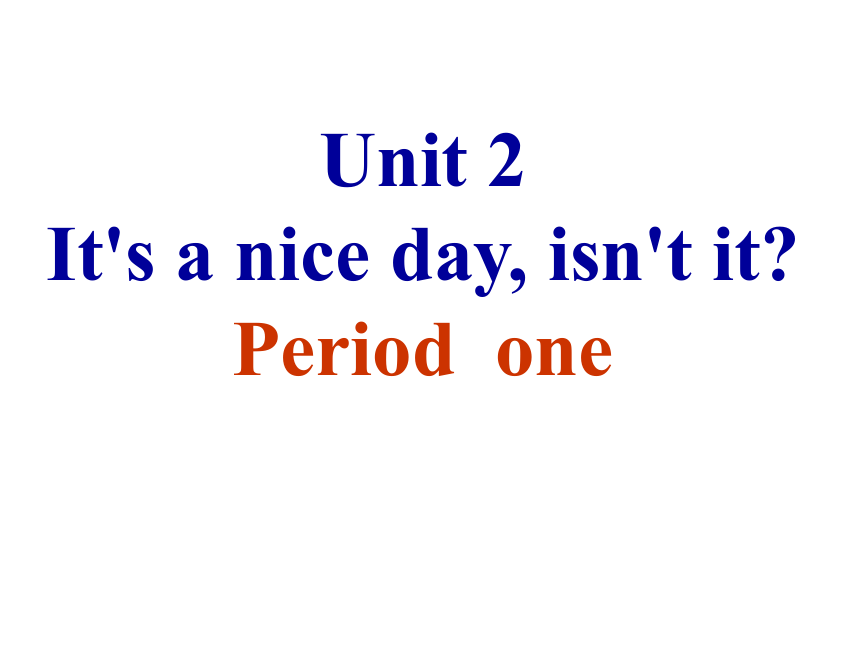
|
|
| 格式 | zip | ||
| 文件大小 | 1.4MB | ||
| 资源类型 | 教案 | ||
| 版本资源 | 鲁教版 | ||
| 科目 | 英语 | ||
| 更新时间 | 2017-05-22 00:00:00 | ||
图片预览

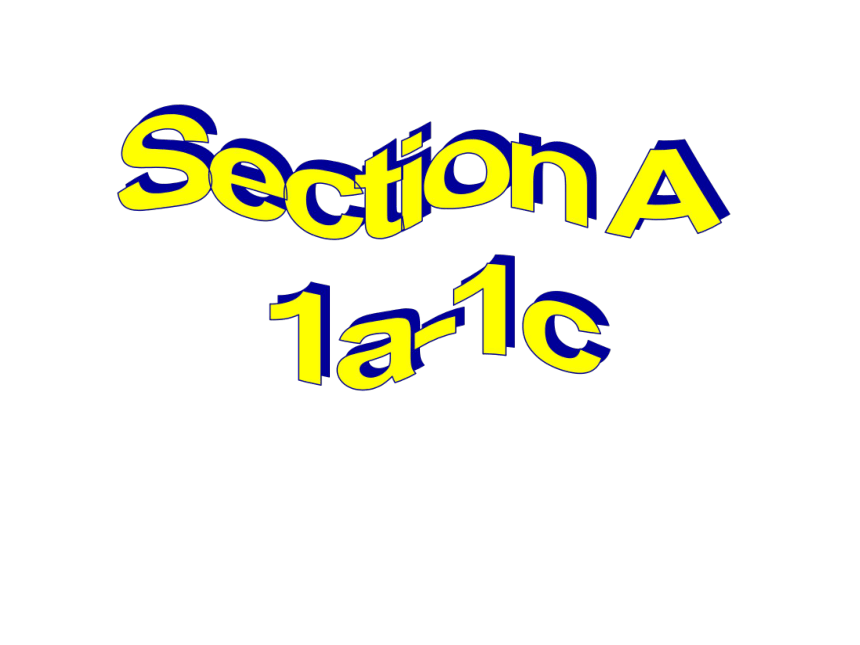
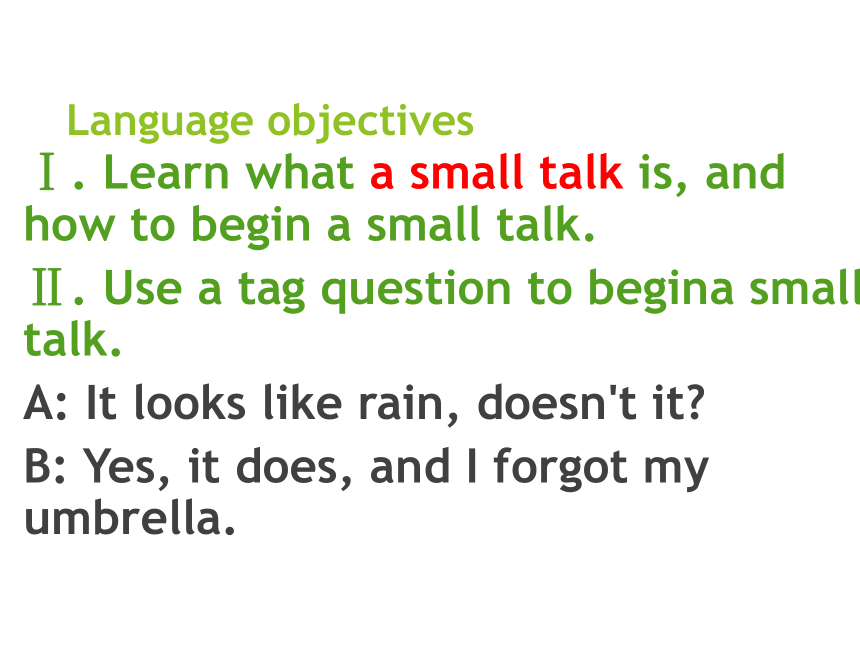
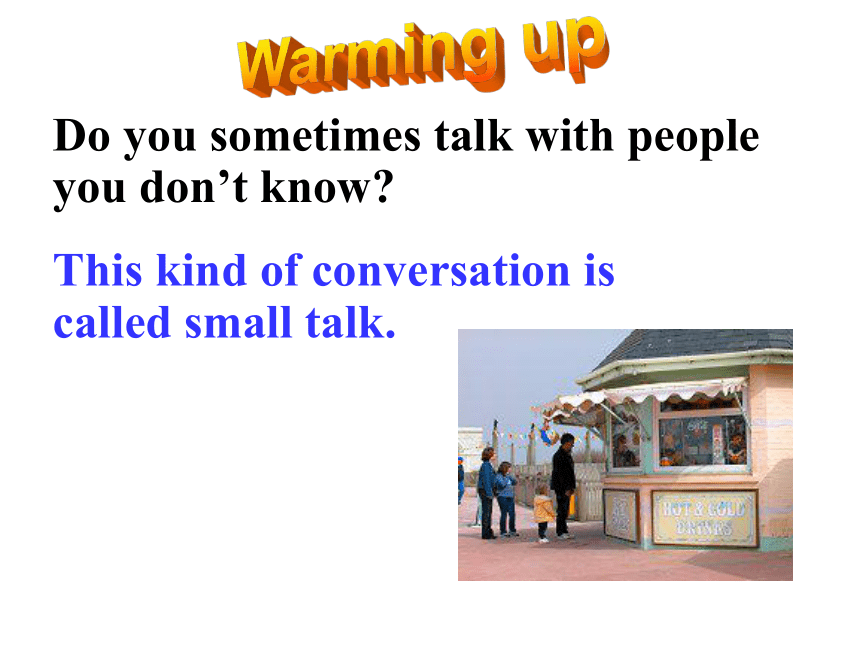
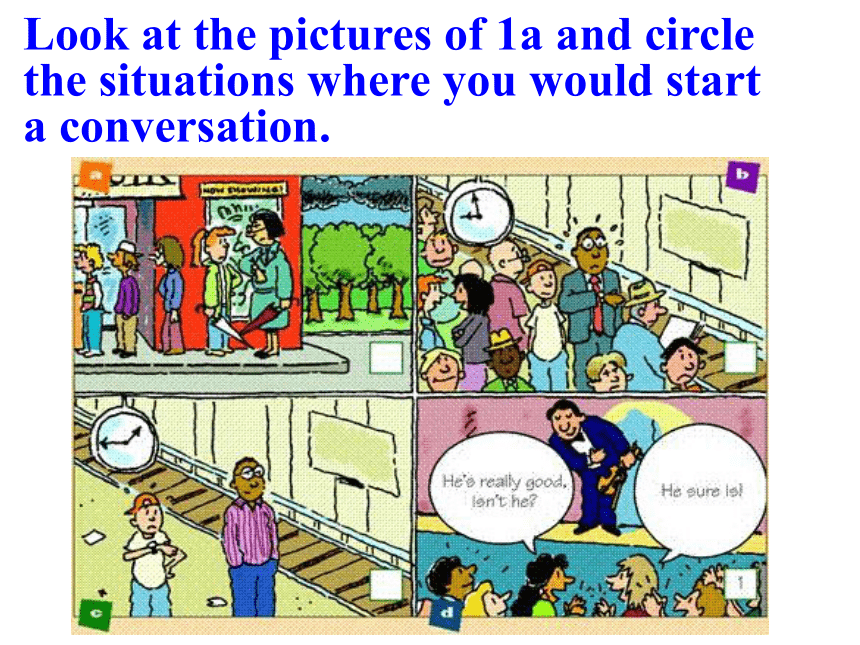
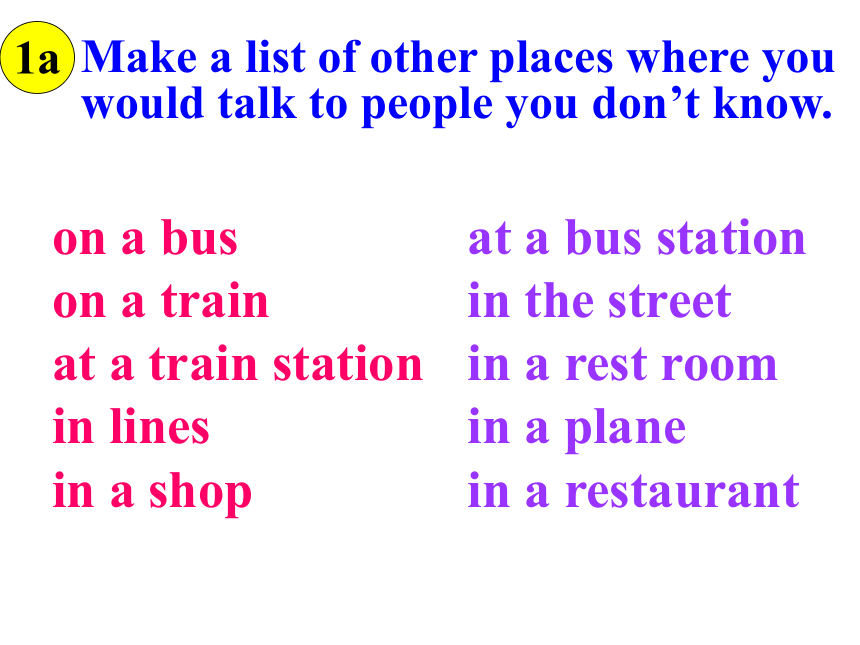
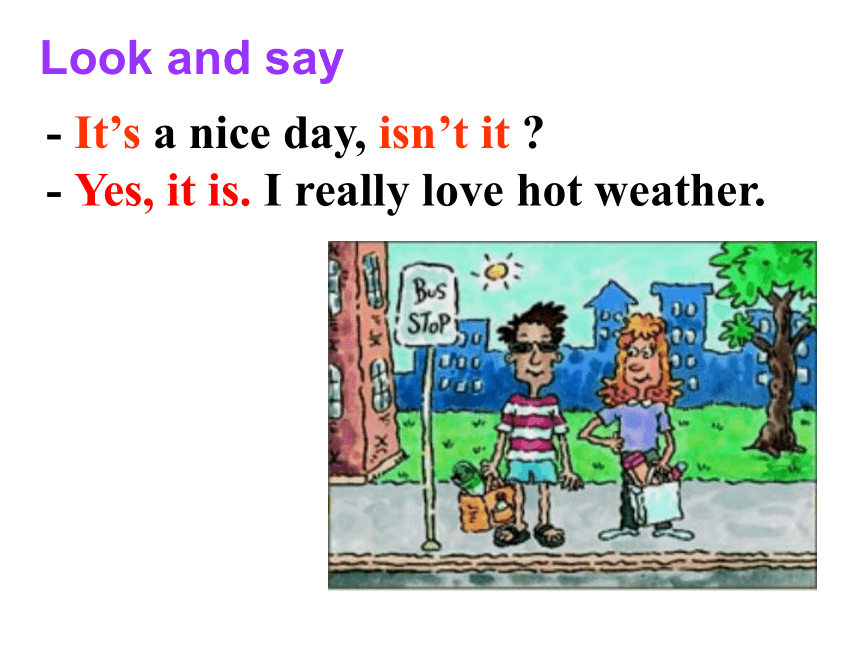
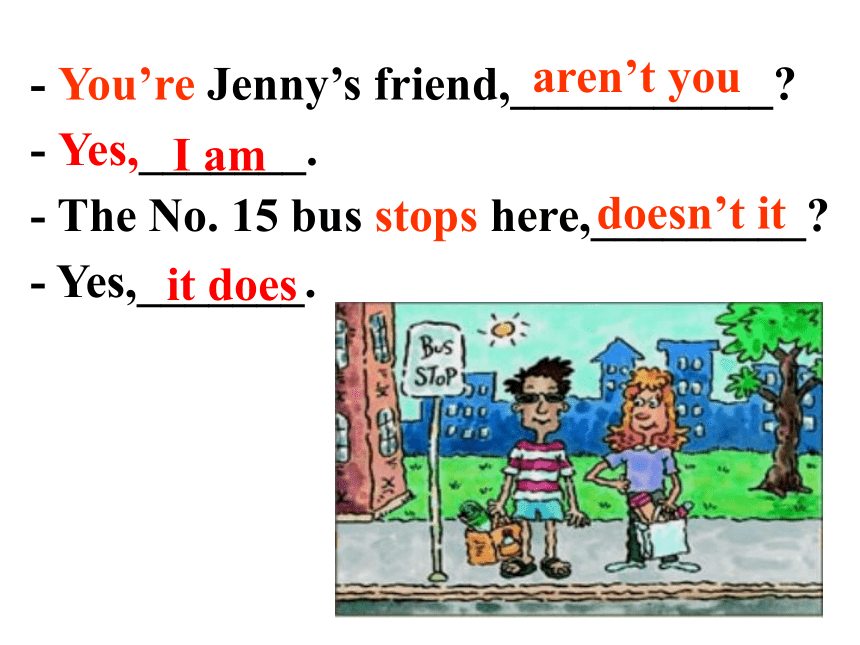
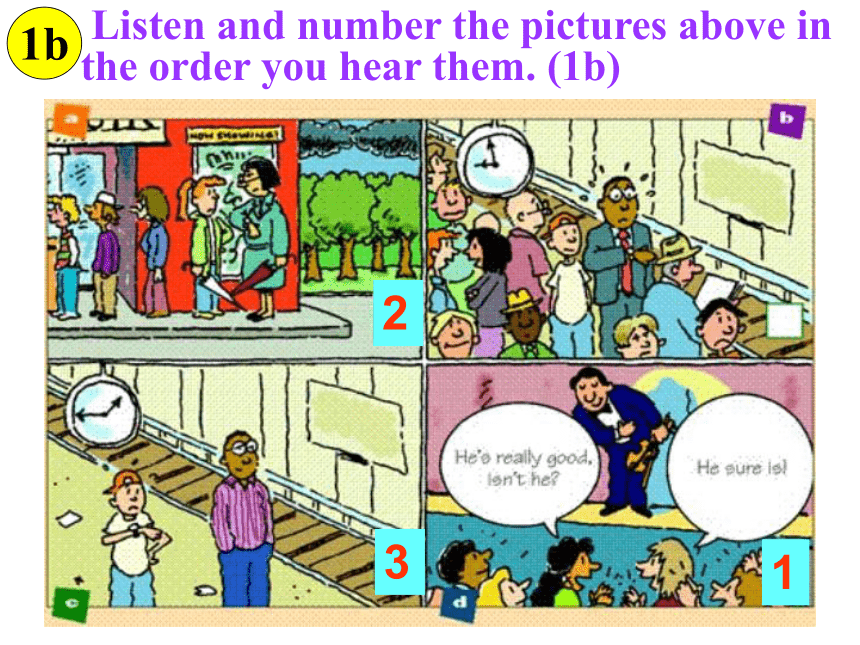
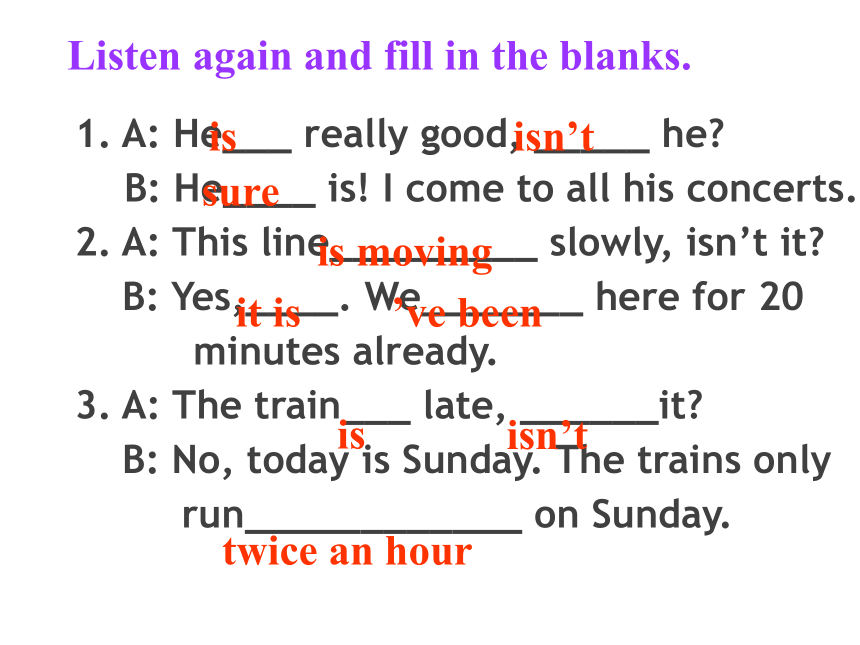
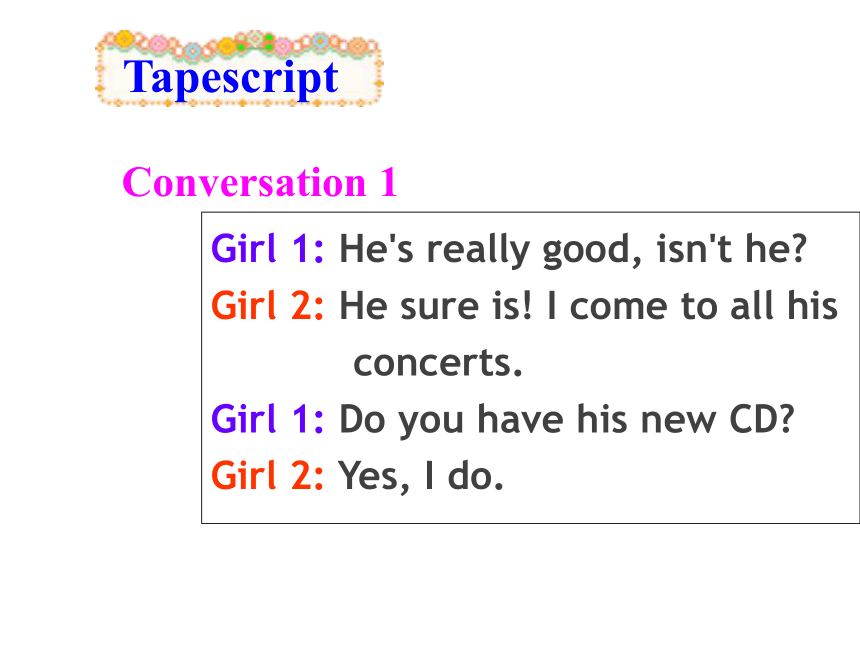

文档简介
课件111张PPT。Unit 2
It's a nice day, isn't it?
Period oneSection A
1a-1cLanguage objectivesⅠ. Learn what a small talk is, and how to begin a small talk.
Ⅱ. Use a tag question to begina small talk.
A: It looks like rain, doesn't it?
B: Yes, it does, and I forgot my umbrella.Warming upDo you sometimes talk with people
you don’t know? This kind of conversation is called small talk.Look at the pictures of 1a and circle
the situations where you would start
a conversation.Make a list of other places where you would talk to people you don’t know.on a bus
on a train
at a train station
in lines
in a shopat a bus station
in the street
in a rest room
in a plane
in a restaurant 1aLook and say- It’s a nice day, isn’t it ?
- Yes, it is. I really love hot weather.- You’re Jenny’s friend,___________?
- Yes,_______.
- The No. 15 bus stops here,_________?
- Yes,_______.aren’t youI amdoesn’t itit does231 Listen and number the pictures above in the order you hear them. (1b)1b1. A: He___ really good, _____ he?
B: He____ is! I come to all his concerts.
2. A: This line_________ slowly, isn’t it?
B: Yes,____. We_______ here for 20
minutes already.
3. A: The train___ late, ______it?
B: No, today is Sunday. The trains only
run____________ on Sunday.Listen again and fill in the blanks. isisn’tsureis movingit is’ve beenisisn’ttwice an hourGirl 1: He's really good, isn't he?
Girl 2: He sure is! I come to all his
concerts.
Girl 1: Do you have his new CD?
Girl 2: Yes, I do.TapescriptConversation 1 Girl 3: This line is moving slowly, isn't it?
Woman: Yes, it is. We've been here for 20 minutes already.
Girl 3: I hope the movie is good.
Woman: So do I. Do you think it's going to rain?
Girl 3: I hope not!
Woman: Me, too.
Conversation 2 Boy: The train is late, isn't it?
Man: No, today is Sunday. The trains only run twice an hour on Sunday.
Boy: Oh, I didn't know that. I usually take the train on weekdays.
Man: Oh, do you take the train to school?
Boy: Yes, I do.Conversation 3 Boy: Take a seat, please.
Girl: Thank you.
Boy: I'm Jack.
Girl: You're Tim's cousin, aren't you?
Boy: Yes, I am.
Girl: I'm Lily. Nice to meet you, Jack.Conversation 4Look at the pictures of 1a and make other conversations. You can use the expressions in the box below. The train is always late, isn’t it?
You love violin music, don’t you?
It looks like rain, doesn’t it?
You're Tim's cousin, aren't you?
A: It looks like rain, doesn’t it?
B: Yes, it does. And I forgot my umbrella. 1cPair work1. — He’s really good, isn’t he?
— He sure is!
【同步造句】
他的确是个好人。
______________________
【用法透析】
sure用作副词,意为“当然,的确,一定”。如:
It sure was very cold yesterday.He sure is a nice man.Language points 【拓展链接】
①sure常用来回答一般疑问句,意为“当然,的确”,相当于yes或certainly。如:
— Are you going with us?
— Sure. / Certainly.
②make sure意为“确保,查明,弄清楚”。其后可接that从句。
如:
She looked around to make sure that she was alone.2. I hope so. I want to go swimming.
【同步造句】
— Do you think we’ll have good weather?
— ____________. (我希望如此。)
【用法透析】
◆I hope so是英语口语中的常用表达, 意为“我希望如此”,其否定形式为I hope not。I hope so如:
— Will Mary leave for Taiyuan?
— I hope not.
◆类似用法还有I think / believe / suppose / guess so等。如:
— Is that Bob?
— Yes, I think so. / No, I don’t think so.
- It’s really windy today, isn’t it?
Yes, it is.
- You’re Ben’s sister, aren’t you?
- Yes, I am.
The No. 15 bus stops here, doesn’t it?
Yes, it does.SummaryTranslate and write them down.1. - 看起来下雨了,不是吗?
- 是的。而且我忘了带伞。
2. - 15号公共汽车不在这停车,对吧?
- 是,它不停。 It looks like rain, doesn’t it?
Yes, it does. I forgot my umbrella. The No. 15 bus doesn’t stop here,
does it?
No, it doesn’t.3. 艾伦讨厌等公共汽车。
Allen hates _______ ____ the bus.
4. 这家商店的价格太高。
The ______in this store are too ______.
5. 这里春天总是下雨,对吗?
It always _____ in spring here, _______it?
6. 玛丽经常在书店里浏览图书。
Mary often _____ _________ books in
bookstores.
7. 这些列车在周末每天仅运行两次。
The trains only run ______ ___ ______
on weekends.twice a daywaiting forprices highrains doesn’tlooks throughUnit 2
It's a nice day, isn't it?
Period twoSection A
2a-2dIt’s really cold today, isn’t it?
The No. 15 bus stops here, doesn’t it?Language objectivesⅠ. Learn the words and phrases: by, noon, chemistry, rest.
Ⅱ. Learn to have successful small talk.
A: It’s really cold today, isn’t it?
B: Yes, it is. I hope the bus comes soon.Warming upDo you know what is the most important to have a successful small talk?Both people need to ask questions. Listen to the three conversations. Are they examples of successful or unsuccessful small talk? Write “S” (for successful) or “U” (for unsuccessful) in the blanks. ___Conversation 1
___Conversation 2
___Conversation 32aUUSfbeadcgListen to conversation 3 again. Put the sentences and questions below in order.2bImagine you are at a bus stop. Make your own small talk. You can use the expressions in the box below.A: It’s really cold today, isn’t it?
B: Yes, it is. I hope the bus comes soon.It’s really cold today, isn’t it?
The No. 15 bus stops here, doesn’t it?2cRole-play the conversation.
2dRead the conversation and find out the Tag questions in the conversation.
You just started yesterday, didn't you?
It's very nice, isn't it?
But you haven't met your teacher yet, have you?
And the school's very big, isn't it?
You have an elder sister, don't you?
1. The students are very friendly.
【同步造句】
他对每一个人都友好。
______________________
【用法透析】
friendly用作形容词,意为“友好的”。常用短语如:be friendly to sb. 对某人友好
be friendly with sb. 和某人关系好
He is friendly to everyone.Language points 2. The chemistry teacher is kind of strict,but the rest are OK.
⑴kind of &a kind of & of a kind.
kind of 稍微,有点儿 修饰v.或adj
a kind of 一种 修饰n.
of a kind 同一种类的 =of the same kind
⑵rest n. 剩余部分 the rest of 其余的,其他的
作主语时,代替可数名词谓语动词用复数;
代替不可数名词谓语动词用单数。
Three of them will go, the rest are to stay here.
the rest of the money is on the desk. Ⅰ.用所给动词的正确形式填空。
1. Lily _________ (write) back to them as soon as she hears from her parents.
2. Tim_________ (be) a computer fan, won’t he?
3. Everyone ____________ (not take) out the books until the teacher arrives at school.
4. Be careful, or you __________ (fall) behind the other students.
will writewill bedoesn't takewill fall用所给动词的正确形式填空。
5. If you ______ (try) your best to do everything, everything is possible.
6. I________ (stay) in Changshan two days ago, now I_______ (stay) in Beijing, I________ (fly) to London in five days.
7. I’ll need______ (do) some ________ (wash) tomorrow.trystayedstaywill flyto dowashingⅡ.单项选择
( ) 1. The children are waiting_____ the bus-stop_____ their teacher.
A. for, at B. at, for C. at, at D. for, for
( ) 2. I’m twenty years old. I’m _ a child.
A. not longer B. no long
C. not any longer D. no longer
( ) 3. I think Chinese is as_____ as English.
A. useful B. more useful
C. most useful D. the mostBDA( ) 4. If it___ tomorrow, we’ll go to the park.
A. will rain B. doesn’t rain
C. won’t rain D. don’t rain
( ) 5.—She studies hard. —___ and ___.
A. so she does; so you do
B. So does she; so you do
C. so does she; so do you
D. So she does; so do you
( ) 6.he man must be very angry____ his daughter, ___?
A. about; isn’t she B. with; isn’t he
C. at; mustn’t she D. with; mustn’t heBDBUnit 2
It's a nice day, isn't it?
Period threeSection A
3a-3cLanguage objectivesⅠ. Learn the words and phrases:
adj. unsure, relaxed, uncomfortable, embarrassed,
n: conversation, stranger, secret(v.)corner
v. suggest adv. shyly, nervously
phrase: next to
Ⅱ. Learn how to deal with a difficult situation.
A: It’s a nice day, isn’t it?
B: Yes, it is.A: The bus is late, isn’t it?
B: Yes, it is.This line is moving slowly, isn’t it?
Do you think it’s going to rain? (…have been waiting for twenty minutes already, forgot to bring umbrella…) Suppose you are in the line ,make
different small talks with your partner.Number the paragraghs of the article in the correct order.3a3, 2, 1Read the passage and answer the questions.3b1. Where was Ben?
2. Why was he scared and nervous?
3. What happened when Ben tried to talk to Tania?
4. What does the writer suggest for Ben's situation?He was at a party.Because he didn't know anyone there.There was a long silence. Ben felt more and more nervous and Tania was looking uncomfortable.A good start point is to ask a person questions about interest or her self, or talk about sth. you both like such as football or pop music.Read the article again and translate the phrases.3b1. 发生在...身上
2. 应对,处理
3. 紧挨着
4. 转向
5. 自我介绍
6. 穿过门
7. 站在角落里
8. 走过来1. happen to ...
2. deal with
3. next to
4. turn to
5. introduce oneself
6. walk through the door
7. stand in the corner
8. come overComplete the questions below. Then write 3 more conversation starters. 3cThis is a really good party, _____________?
You are a friend of David's, ____________?
(weather)____________________________?
(food at the party)
_____________________________________?
(a music group)
_____________________________________isn't itaren't youIt's a nice day, isn't itThe food at the party was delicious, wasn't itThe music group is very popular, isn't it?lanuage points:
1. This can make social situations more relaxed.
make sb./sth. 接名词,形容词,分词做宾补。
The new film made them exciting.
What he said made us happy.CFriends like you make life __________ to live in a new place.
A. to easy B. to be easy
C. easier D. very easier 2. What does the writer suggest for Ben's situation?
1)?suggest+?n./pron.?suggest+?n./pron.?to+sb.,但不能说suggest?sb?sth??
eg:??We?suggest?him?the?plan.?(×)?
?We?suggest?the?plan?to?him.(√)?
2)?suggest?doing?sth?
eg???He?suggested?going?out?for?a?walk.?
注意:suggest?不可以加不定式He?suggested?to?go?out?for?a?walk.(Χ)?2.3)??suggest?+(that?)+主+(should)?do+sth??
eg:??He?suggested?that?you?(should)?go? there?tomorrow.?
注意,不可以这样说:He?suggested?you?to?go?there?tomorrow.?
suggest不可以加不定式的复合结构。?
4)suggestion主语,其后也用这个结构:?
The?suggestion?is?that?+主+should?+do?sth?
eg:??His?suggestion?is?that?I?should?leave? for?Beijing?immediately.?Ⅰ.连词成句:
1. train, his, he, umbrella, yesterday, the, on, left
______________________________________.
2. prices, really, low, their, are, they, aren’t
______________________________________?
3. for, showing, me, thanks, last, school, week, the
______________________________________.
4. well, getting, I, with, am, him, along
______________________________________.
5. there, with, is, your, nothing, car, wrong
______________________________________.He left his umbrella on the train yesterdayTheir prices are really low,aren't theyThanks for showing me the school last weekI am getting along well with himThere is nothing wrong with your carUnit 2
It's a nice day, isn't it?
Period fourSection A
GF-4CLanguage objectivesⅠ. Learn the words and phrases:
attend, community; wait in line.
Ⅱ. Learn the Grammar-Tag questions.
Ⅲ.Can use Tag questions to begin a small talk.
study hardcome to school earlysleep lateB:Yes, I do.
No, I don’t.A:You …, don’t you? ReviewWrite these questions in a different way.
1.Are you Jenny? _______________________
2.Does the bus stop here?
The bus stops here, ____________
3.Is today Tuesday?
Today is Tuesday, ______________
4.Do they play soccer?
They play soccer, ______________
5.Are they teachers?
They are teachers, _______________
6.Is Anna your sister?
______________________________ You’re Jenny, aren’t you?doesn’t it?isn’t it?don’t they?aren’t they?Anna is your sister, isn’t she?反意疑问句
1)定义:提出情况和看法,询问对方是否同意的句子叫反意疑问句。
2)结构:陈述句+简略疑问句
3) 用法:a.前肯后否;前否后肯。
b.反问部分的时态和人称与陈述部分的人称和时态一致。
c.本身表否定的nothing,never,little,few。【自学语法 共克疑难】Mary likes reading,doesn’t she?
玛丽喜欢读书,是吧?
(前一部分为肯定,后一部分用否定)
Mary doesn’t like reading,does she?
玛丽不喜欢读书,是吧?
(前一部分为否定,后一部分就用肯定)1. 如果陈述句有一个助动词(包括can,
must,need等情态动词),其简短问句
用同一个助动词。
例如:He can swim,can’t he?
他会游泳,对吗?
2. 如果陈述部分包含no,never,hardly,
few,little,seldom等否定词,简短问句
部分应用肯定形式。
例如:
You have no time on Monday, have you?
星期一你没有时间,是吗?3. 陈述句部分是there be句型时,简短问句
部分也用there be。
例如:
There're some eggs in the bag,aren't there?
袋子里有些鸡蛋,是吗?
4. 在英语口语中,I am后面的简短问句
用aren't I?
例如:I’m late,aren’t I?
我迟到了,是吗?5. 当陈述句部分含有否定词如nothing,
nobody等不定代词时,简短问句部分
应用肯定结构。为避免重复,用代词it来
代替nothing;用they或he来代替nobody。
例如:
Everything goes well,doesn’t it?
一切顺利,是吗?
Everyone is here,aren’t they?
(注意:此句问句与前句动词的数不一致.)everyone everybody
someone somebody
no one nobody nonetheyeverything anything
something nothing itEveryone is here having a meeting, aren’t they?Something is in that bottle, isn’t it?6. 祈使句后面的简短问句使用 will you?
shall we?它们不是真正的疑问句,但常用
升调。will,would,can,can’t及
shall we用来告诉人们该做什么事,表请求。
eg:Give me a pen,will you?
请给我一支笔。
Open the door,will you?
请打开门好吗?
Let’s go together,shall we?
咱们一起走吧。7. 在 I think,I believe,I suppose,
I guess等结构中,简短问句的主语往往
与从句的主谓保持一致,例如:
I think she’s out,isn’t she?
我想她出去了,是吗?
I don’t think it’s true,is it?
我认为那不是真的,对吗?
注意:在回答反意疑问句的问题时,
如果回答是肯定的,要用yes,否定的要
用no,在第一部分是否定形式时要特别
注意,这时的英语回答与汉语回答是有
区别的。
例如:This isn’t yours,is it?
这不是你的,是吗?
Yes, it is. 不,是我的。
No, it isn't. 是的,不是我的。Ⅰ.完成下列反意疑问句
1. She is a school girl, __________?
2. It looks like rain, ____________?
3. They go there by bus, __________?
4. His mother goes to work at 8:00,
__________?
5. The girl can sing an English song,
__________?
【达标训练 自我检测】isn't shedoesn't itdon't theydoesn't shecan't sheⅠ.完成下列反意疑问句
6. The students had a class meeting
yesterday, __________?
7. He forgot his umbrella, ___________?
8. There was a telephone for you,
___________ ?
9. Let’s clean our bedroom, _________?
10. I think he is a teacher, _________?
【达标训练 自我检测】didn't theydidn't hewasn't therewill youisn't heFill in the blanks with the appropriate Tag questions. Then match the questions and answers. 4a1. You attend the community event on Friday,
__________ _____
2. You're on the school basketball team,
__________ _____
3. You like our school, __________ _____
4. It was really cold last night,_______ _____
5. We haven't met before, __________ _____ didn't youaren't youdon't youwasn't ithave wecebadA: This is great weather, isn’t it?
B: It sure is. But it’s a little hot for me.
A: Oh, I love hot weather. ___________.
B: Which beach are you going to?
A: I’m going to Today Beach.
____________________________.
B: I usually go to Sandy Beach.
A: ______________________________.
B: No, it’s never crowded. Well, have a good day!
A: ______________________________.
B: Goodbye.4bWrite the sentences in the correct places .I’m going to the beach todayWhich beach do you usually go?Oh, It's crowded there, isn't it?You, too. Goodbye.4cMake up conversation for two of the situations.playing in the park
meeting a group of friends in the shopping center
waiting in line at the movie theater
meeting at the dinning hallA: It's hot day, isn't it?
B: Yes, I'm glad we're inside.
A: It's a perfect day for shopping in a cool shopping center.ExercisesⅠ.Fill in the blanks using the tag questions.
1. He wouldn't wait in line the next day,
________ ?
2. She has been learning English,________ ?
3. We can't take the books out,________ ?
4. He has to go home on foot, ________ ?
5. You haven't had your lunch, ________ ?
6. We have nothing to eat, ________ ?
7. They dislike the book,_________ ?
8. There used to be a post office in the street,
______________ ?
would hehasn't shecan wedoesn't hehave youhave wedon't theyusedn't there 9. There wasn’t a meeting last Friday,
___________?
10. We could speak both Chinese and English,
___________ ?
11. You’ve never seen such an exciting movie,
__________?
12. Let’s go for a walk after supper, ______ ?
13. Let us clean the blackboard, ________ ?
14. Don’t talk too loud in public, _______ ?
15. Have a nice day, ________?was there couldn’t we have you shall wewill you will you will youUnit 2
It's a nice day, isn't it?
Period fiveSection B
1a-1eLanguage objectivesⅠ. Learn the usage of the words:
cost, spend, take, pay;
Ⅱ. Learn how to make a small talk with a Tag question.
A: This is a great party, isn't it?
B: Yes, it is.
Work in groups to discuss the following questions.
What is the polite small talk? What is not? Give some examples and try to say why.Warming up Do you like action movies? You’re Anna’s brother, aren’t you? How much did that shirt cost? How old are you? How big is your flat(公寓)?Check (√) the questions you think are good for polite small talk with people you don’t know well.在闲谈时,问别人私人的问题(比如年龄、收入等)是不礼貌的,应当避免。Attention:1aMake up a conversation using one of the questions in 1a. Then practice the conversation with your partner. 1bA: Do you like action movies?
B: No, but I love comedies.Listen to the three conversations. Where are the people in each conversation? Write the places in the chart.at a partyat schoolat a ball game1cListening Listen again. Match each question with the correct answer.Questions1. You’re Jenny’s friend, aren’t you?
2. So, tell me about yourself,Rita. Do you play any sports?
3. What do you think of the school?
4.You’ve always been in this school, haven’t you?
5. It’s really crowded, isn’t it?
6. Did you see Friday night's game on TV ?a. Yes, it is. Are you a ball game fan?
b. No, I haven't. I started here last year.
c. It's great.
d. Yes, I am. My name is Rita.
e. Yes, I did. It was really exciting, wasn’t it?
f. Yeah! I play tennis and ping-pong.Answersdfcbae1dRole play a small talk conversation. Yoo can
choose one of the openers below.1ePair workA: This is a great party, isn't it?
B: Yes, it is.
1. You are new here, aren't you?
2. This is a great party, isn't it?
3. Hi! My name's Andy. I'm Karen's brother.
4. You love baseball games, don't you?Language points?spend&cost&take&pay
spend的主语必须是人,?常用于以下结构:??
(1)?spend?time?/money?on?sth.?
在……上花费时间(金钱)。??
I?spent?two?hours?on?this?maths?problem.????
(2)?spend?time?/?money?(in)?doing?sth.?
花费时间(金钱)做某事。??
They?spent?two?years?(in)?building?this?flat.????
(3)spend?money?for?sth.?花钱买……??
His?money?was?spent?for?books.cost 主语是物或某种活动,表示"值",用法:??
(1)sth.?costs?(sb.)?+金钱,
某物花了(某人)多少钱。??
A?new?computer?costs?a?lot?of?money.???
(2)?(doing)?sth.?costs?(sb.)?+时间,
某物(做某事)花了(某人)多少时间。??
Remembering?these?new?words?cost?him?
a?lot?of?time.??
注意:cost的过去式及过去分词都是cost,
并且不能用于被动句。take后面常跟双宾语,用法有以下几种:??
(1)?It?takes?sb.?+时间+to?do?sth.?
做某事花了某人多少时间。??
It?took?them?three?years?to?build?this?road.?
他们用了三年时间修完了这条路。??
(2)doing?sth.?takes?sb.?+时间,
做某事花了某人多少时间。??
Repairing?this?car?took?him?the?whole?
afternoon.?他花了一下午修车。pay的基本用法是:??
(1)?pay?(sb.)?money?for?sth.?
付钱(给某人)买……。??
I?have?to?pay?them?20?pounds?for?this?
room?each?month.?
我每个月要付20英磅的房租。??
(2)pay?for?sth.?付……的钱。??
I?have?to?pay?for?the?book?lost.?
我不得不赔丢失的书款。(3)pay?for?sb.?替某人付钱??
例:Don't?worry! I'll?pay?for?you.?
别担心,?我会给你付钱的。??
(4)pay?sb.?付钱给某人??
例:?They?pay?us?every?month.
他们每月给我们报酬。??
(5)pay?money?back?还钱?
例:May?I?borrow?12?yuan?from?you??
I'll?pay?it?back?next?week.?
你能借给我12块钱吗?下周还你。??
(6)pay?off?one's?money还清钱1.?I'm?interested?in?animals,so?I___every?
saturday?working?in?an?animal?hospital.?
A.?Pay???????????B.?cost????????C.?take????????D.?spend
2.?They?spend?too?much?time____the?report.?A.?writing?B.?to?write??C.?on?writing??D.?write
3.?--What?beautiful?shoes?you’re?wearing!?
They?must?be?expensive(贵).?
--No,they?only____l0?yuan.?
A.spent????B.took????C.paid????D.costPracticeDAD4.?--Will?you?please___for?my?dinner?Peter????
--Sure!?
A.?spend????B.?pay????C.?cost????D.take
5.?It?will?????me?too?much?time?to?read?this?book.?
A.?take????B.?cost?????C.?spend?????D.pay
6.?This?story?book?__?me?much money.
A.?took????B.cost??????C?used??????D.spent
7.-Do?you?often?get?online??
?-Yes,?I?____?lots?of?time?on?it.?It’s?a?good?way?
to?kill?time.?
A.?cost?????B.?spend??????C.take???????D.?payBABBUnit 2
It's a nice day, isn't it?
Period six~sevenSection B
2a-2eLanguage objectivesⅠ. Learn the words and phrases on page 14.
Ⅱ. Learn what a small talk is and how to begin a succussful small talk. Warming up1. culture n.____________(adj.)
2. similar adj.___________(n.)
3. help v._______________(adj.)
4. nice adj.______________(adv.)
5. work v._______________(n.)
6. greet v._______________(n.)
7. introduce v.___________(n.)
8. humor n.______________(adj.)
culturalsimilarityhelpfulnicelyworker/worksgreetingintroductionhumorousWhen Chinese people meet each other for the first time, what do they usually talk about? Discuss it with a partner.2aRead the first sentence of each paragraph from an article about small talk. What do you think the paragraphs will be about? Match each paragraphA-E with a heading below 1-5.2b1. Cultural differences
2. Cultural similarities
3. What is small talk?
4. What should we talk about?
5. An everyday activity3,5,2,1,42cLook again at the topic sentences. In which paragraph do you expect to find the answer to the following questions?_:What do people often talk about in
England? Why?
_:How does small talk make other people feel?
_:What kind of people use small talk in
their jobs?
_:Which common questions in China might
not be right for other countries?
_:Which rules of small talk are the same in
most countries?
_:Where do people often make small talk?512431Now read the whole article to answer the questions in 2c.
2d1. What do people often talk about in
England? Why?
2. How does small talk make other people feel?
3. What kind of people use small talk in
their jobs?The weather. Because it chages so much.It make others feel relaxed and it passes time nicely. Business travelers, workers in shops or restauants.4. Which common questions in China might
not be right for other countries?
5. Which rules of small talk are the same in
most countries?
6. Where do people often make small talk?In China, we can ask people if they are
married or whether they have children.
Have you eaten yet?It's important to smile and keep the conversation light and humorous.At an airport or bus stop.Look at the list of the subjects. What questions could you ask to start some small talk about each subject? 2etravel pets television sports work
weather general news music hobbies food
holidays films books studies
1. business n. 商业,生意
on business 因公事 businessman 商人
eg. We do business with a number of companies.2. depend on 取决于
eg. All depends on the weather.
一切取决于天气。3. avoid v. 避免,回避
跟名词,代词,动名词作宾语, 不接to do.Language pointsⅠ. 单项选择
1. The prices are really ______, aren’t they?
A. expensive B. cheap C. low D. tall
2. How much did the new car __________?
A. pay B. cost C. take D. spend
3. He’s much better now, __________ he?
A. is B. isn’t C. has D. hasn’t
4. She’s come back, __________ she?
A. is B. isn’t C. has D. hasn’t
5. She hopes her son __________ better soon.
A. to be B. will be C. be D. being
CBBDB8. —You haven’t been to Sanya, have you?
—__________. How I wish to go there!
A. Yes, I have B. No, I haven’t
C. No, I have D. Yes, I haven’t
9. Friends like you make life ________ to live
in a new place.
A. to easy B. to be easy C. easierD. very easier
10. I told you not to be late, __________I?
A. do B. don’t C. did D. didn’t
11. I forgot __________ my ruler with me.
Can I use yours?
A. bring B. brought C. take D. to take
BCCD翻译下列句子
1. 在英语中,人们通常说它是打破沉默。
2. 他们可能会被问及是怎样到会的, 或者宾馆是否舒适。
3.所以,我们应该谈论一些安全的话题,比如天气。
In English, people often say it "break the ice". They might be asked about how they got to the meeting or if their hotel is comfortable.Therefor, we should usually discuss"safe"
subjects like the weather, which is common in many cultures. Unit 2
It's a nice day, isn't it?
Period eightSection B
3a-self-checkLanguage objectivesⅠ. Remember the words:
general, sample, tip, exhibition;
Ⅱ. Write a short article for a school magazine giving advice about small talk.Think of situations where you have to make small talk. What are good things to talk about? What things should not to talk about? Put the phrases in the correct box.3ain a bookstore with a strangerin the school hall with a classmatea first meeting for a school clubweatherTV shows or moviesfavorite thingssomeone you like or hatefamily problemsjobsmoneyWrite a short article for a school magazine giving advice about small talk.3b1. Describe the different situations for
small talk.
2. Give advice about what to talk about.
3. Write a short sample dialog.Write a short article for a school magazine giving advice about small talk.3bUseful language:
Do you know how to make successful small talk?
Here are some tips and advice.
You may need to make small talk whetn ______.
It is a good idea to __________.
You should/shouldn't talk about ___because__.
When / If you ____, you could talk about_____.
Small talk is easy if______.Bye-bye
It's a nice day, isn't it?
Period oneSection A
1a-1cLanguage objectivesⅠ. Learn what a small talk is, and how to begin a small talk.
Ⅱ. Use a tag question to begina small talk.
A: It looks like rain, doesn't it?
B: Yes, it does, and I forgot my umbrella.Warming upDo you sometimes talk with people
you don’t know? This kind of conversation is called small talk.Look at the pictures of 1a and circle
the situations where you would start
a conversation.Make a list of other places where you would talk to people you don’t know.on a bus
on a train
at a train station
in lines
in a shopat a bus station
in the street
in a rest room
in a plane
in a restaurant 1aLook and say- It’s a nice day, isn’t it ?
- Yes, it is. I really love hot weather.- You’re Jenny’s friend,___________?
- Yes,_______.
- The No. 15 bus stops here,_________?
- Yes,_______.aren’t youI amdoesn’t itit does231 Listen and number the pictures above in the order you hear them. (1b)1b1. A: He___ really good, _____ he?
B: He____ is! I come to all his concerts.
2. A: This line_________ slowly, isn’t it?
B: Yes,____. We_______ here for 20
minutes already.
3. A: The train___ late, ______it?
B: No, today is Sunday. The trains only
run____________ on Sunday.Listen again and fill in the blanks. isisn’tsureis movingit is’ve beenisisn’ttwice an hourGirl 1: He's really good, isn't he?
Girl 2: He sure is! I come to all his
concerts.
Girl 1: Do you have his new CD?
Girl 2: Yes, I do.TapescriptConversation 1 Girl 3: This line is moving slowly, isn't it?
Woman: Yes, it is. We've been here for 20 minutes already.
Girl 3: I hope the movie is good.
Woman: So do I. Do you think it's going to rain?
Girl 3: I hope not!
Woman: Me, too.
Conversation 2 Boy: The train is late, isn't it?
Man: No, today is Sunday. The trains only run twice an hour on Sunday.
Boy: Oh, I didn't know that. I usually take the train on weekdays.
Man: Oh, do you take the train to school?
Boy: Yes, I do.Conversation 3 Boy: Take a seat, please.
Girl: Thank you.
Boy: I'm Jack.
Girl: You're Tim's cousin, aren't you?
Boy: Yes, I am.
Girl: I'm Lily. Nice to meet you, Jack.Conversation 4Look at the pictures of 1a and make other conversations. You can use the expressions in the box below. The train is always late, isn’t it?
You love violin music, don’t you?
It looks like rain, doesn’t it?
You're Tim's cousin, aren't you?
A: It looks like rain, doesn’t it?
B: Yes, it does. And I forgot my umbrella. 1cPair work1. — He’s really good, isn’t he?
— He sure is!
【同步造句】
他的确是个好人。
______________________
【用法透析】
sure用作副词,意为“当然,的确,一定”。如:
It sure was very cold yesterday.He sure is a nice man.Language points 【拓展链接】
①sure常用来回答一般疑问句,意为“当然,的确”,相当于yes或certainly。如:
— Are you going with us?
— Sure. / Certainly.
②make sure意为“确保,查明,弄清楚”。其后可接that从句。
如:
She looked around to make sure that she was alone.2. I hope so. I want to go swimming.
【同步造句】
— Do you think we’ll have good weather?
— ____________. (我希望如此。)
【用法透析】
◆I hope so是英语口语中的常用表达, 意为“我希望如此”,其否定形式为I hope not。I hope so如:
— Will Mary leave for Taiyuan?
— I hope not.
◆类似用法还有I think / believe / suppose / guess so等。如:
— Is that Bob?
— Yes, I think so. / No, I don’t think so.
- It’s really windy today, isn’t it?
Yes, it is.
- You’re Ben’s sister, aren’t you?
- Yes, I am.
The No. 15 bus stops here, doesn’t it?
Yes, it does.SummaryTranslate and write them down.1. - 看起来下雨了,不是吗?
- 是的。而且我忘了带伞。
2. - 15号公共汽车不在这停车,对吧?
- 是,它不停。 It looks like rain, doesn’t it?
Yes, it does. I forgot my umbrella. The No. 15 bus doesn’t stop here,
does it?
No, it doesn’t.3. 艾伦讨厌等公共汽车。
Allen hates _______ ____ the bus.
4. 这家商店的价格太高。
The ______in this store are too ______.
5. 这里春天总是下雨,对吗?
It always _____ in spring here, _______it?
6. 玛丽经常在书店里浏览图书。
Mary often _____ _________ books in
bookstores.
7. 这些列车在周末每天仅运行两次。
The trains only run ______ ___ ______
on weekends.twice a daywaiting forprices highrains doesn’tlooks throughUnit 2
It's a nice day, isn't it?
Period twoSection A
2a-2dIt’s really cold today, isn’t it?
The No. 15 bus stops here, doesn’t it?Language objectivesⅠ. Learn the words and phrases: by, noon, chemistry, rest.
Ⅱ. Learn to have successful small talk.
A: It’s really cold today, isn’t it?
B: Yes, it is. I hope the bus comes soon.Warming upDo you know what is the most important to have a successful small talk?Both people need to ask questions. Listen to the three conversations. Are they examples of successful or unsuccessful small talk? Write “S” (for successful) or “U” (for unsuccessful) in the blanks. ___Conversation 1
___Conversation 2
___Conversation 32aUUSfbeadcgListen to conversation 3 again. Put the sentences and questions below in order.2bImagine you are at a bus stop. Make your own small talk. You can use the expressions in the box below.A: It’s really cold today, isn’t it?
B: Yes, it is. I hope the bus comes soon.It’s really cold today, isn’t it?
The No. 15 bus stops here, doesn’t it?2cRole-play the conversation.
2dRead the conversation and find out the Tag questions in the conversation.
You just started yesterday, didn't you?
It's very nice, isn't it?
But you haven't met your teacher yet, have you?
And the school's very big, isn't it?
You have an elder sister, don't you?
1. The students are very friendly.
【同步造句】
他对每一个人都友好。
______________________
【用法透析】
friendly用作形容词,意为“友好的”。常用短语如:be friendly to sb. 对某人友好
be friendly with sb. 和某人关系好
He is friendly to everyone.Language points 2. The chemistry teacher is kind of strict,but the rest are OK.
⑴kind of &a kind of & of a kind.
kind of 稍微,有点儿 修饰v.或adj
a kind of 一种 修饰n.
of a kind 同一种类的 =of the same kind
⑵rest n. 剩余部分 the rest of 其余的,其他的
作主语时,代替可数名词谓语动词用复数;
代替不可数名词谓语动词用单数。
Three of them will go, the rest are to stay here.
the rest of the money is on the desk. Ⅰ.用所给动词的正确形式填空。
1. Lily _________ (write) back to them as soon as she hears from her parents.
2. Tim_________ (be) a computer fan, won’t he?
3. Everyone ____________ (not take) out the books until the teacher arrives at school.
4. Be careful, or you __________ (fall) behind the other students.
will writewill bedoesn't takewill fall用所给动词的正确形式填空。
5. If you ______ (try) your best to do everything, everything is possible.
6. I________ (stay) in Changshan two days ago, now I_______ (stay) in Beijing, I________ (fly) to London in five days.
7. I’ll need______ (do) some ________ (wash) tomorrow.trystayedstaywill flyto dowashingⅡ.单项选择
( ) 1. The children are waiting_____ the bus-stop_____ their teacher.
A. for, at B. at, for C. at, at D. for, for
( ) 2. I’m twenty years old. I’m _ a child.
A. not longer B. no long
C. not any longer D. no longer
( ) 3. I think Chinese is as_____ as English.
A. useful B. more useful
C. most useful D. the mostBDA( ) 4. If it___ tomorrow, we’ll go to the park.
A. will rain B. doesn’t rain
C. won’t rain D. don’t rain
( ) 5.—She studies hard. —___ and ___.
A. so she does; so you do
B. So does she; so you do
C. so does she; so do you
D. So she does; so do you
( ) 6.he man must be very angry____ his daughter, ___?
A. about; isn’t she B. with; isn’t he
C. at; mustn’t she D. with; mustn’t heBDBUnit 2
It's a nice day, isn't it?
Period threeSection A
3a-3cLanguage objectivesⅠ. Learn the words and phrases:
adj. unsure, relaxed, uncomfortable, embarrassed,
n: conversation, stranger, secret(v.)corner
v. suggest adv. shyly, nervously
phrase: next to
Ⅱ. Learn how to deal with a difficult situation.
A: It’s a nice day, isn’t it?
B: Yes, it is.A: The bus is late, isn’t it?
B: Yes, it is.This line is moving slowly, isn’t it?
Do you think it’s going to rain? (…have been waiting for twenty minutes already, forgot to bring umbrella…) Suppose you are in the line ,make
different small talks with your partner.Number the paragraghs of the article in the correct order.3a3, 2, 1Read the passage and answer the questions.3b1. Where was Ben?
2. Why was he scared and nervous?
3. What happened when Ben tried to talk to Tania?
4. What does the writer suggest for Ben's situation?He was at a party.Because he didn't know anyone there.There was a long silence. Ben felt more and more nervous and Tania was looking uncomfortable.A good start point is to ask a person questions about interest or her self, or talk about sth. you both like such as football or pop music.Read the article again and translate the phrases.3b1. 发生在...身上
2. 应对,处理
3. 紧挨着
4. 转向
5. 自我介绍
6. 穿过门
7. 站在角落里
8. 走过来1. happen to ...
2. deal with
3. next to
4. turn to
5. introduce oneself
6. walk through the door
7. stand in the corner
8. come overComplete the questions below. Then write 3 more conversation starters. 3cThis is a really good party, _____________?
You are a friend of David's, ____________?
(weather)____________________________?
(food at the party)
_____________________________________?
(a music group)
_____________________________________isn't itaren't youIt's a nice day, isn't itThe food at the party was delicious, wasn't itThe music group is very popular, isn't it?lanuage points:
1. This can make social situations more relaxed.
make sb./sth. 接名词,形容词,分词做宾补。
The new film made them exciting.
What he said made us happy.CFriends like you make life __________ to live in a new place.
A. to easy B. to be easy
C. easier D. very easier 2. What does the writer suggest for Ben's situation?
1)?suggest+?n./pron.?suggest+?n./pron.?to+sb.,但不能说suggest?sb?sth??
eg:??We?suggest?him?the?plan.?(×)?
?We?suggest?the?plan?to?him.(√)?
2)?suggest?doing?sth?
eg???He?suggested?going?out?for?a?walk.?
注意:suggest?不可以加不定式He?suggested?to?go?out?for?a?walk.(Χ)?2.3)??suggest?+(that?)+主+(should)?do+sth??
eg:??He?suggested?that?you?(should)?go? there?tomorrow.?
注意,不可以这样说:He?suggested?you?to?go?there?tomorrow.?
suggest不可以加不定式的复合结构。?
4)suggestion主语,其后也用这个结构:?
The?suggestion?is?that?+主+should?+do?sth?
eg:??His?suggestion?is?that?I?should?leave? for?Beijing?immediately.?Ⅰ.连词成句:
1. train, his, he, umbrella, yesterday, the, on, left
______________________________________.
2. prices, really, low, their, are, they, aren’t
______________________________________?
3. for, showing, me, thanks, last, school, week, the
______________________________________.
4. well, getting, I, with, am, him, along
______________________________________.
5. there, with, is, your, nothing, car, wrong
______________________________________.He left his umbrella on the train yesterdayTheir prices are really low,aren't theyThanks for showing me the school last weekI am getting along well with himThere is nothing wrong with your carUnit 2
It's a nice day, isn't it?
Period fourSection A
GF-4CLanguage objectivesⅠ. Learn the words and phrases:
attend, community; wait in line.
Ⅱ. Learn the Grammar-Tag questions.
Ⅲ.Can use Tag questions to begin a small talk.
study hardcome to school earlysleep lateB:Yes, I do.
No, I don’t.A:You …, don’t you? ReviewWrite these questions in a different way.
1.Are you Jenny? _______________________
2.Does the bus stop here?
The bus stops here, ____________
3.Is today Tuesday?
Today is Tuesday, ______________
4.Do they play soccer?
They play soccer, ______________
5.Are they teachers?
They are teachers, _______________
6.Is Anna your sister?
______________________________ You’re Jenny, aren’t you?doesn’t it?isn’t it?don’t they?aren’t they?Anna is your sister, isn’t she?反意疑问句
1)定义:提出情况和看法,询问对方是否同意的句子叫反意疑问句。
2)结构:陈述句+简略疑问句
3) 用法:a.前肯后否;前否后肯。
b.反问部分的时态和人称与陈述部分的人称和时态一致。
c.本身表否定的nothing,never,little,few。【自学语法 共克疑难】Mary likes reading,doesn’t she?
玛丽喜欢读书,是吧?
(前一部分为肯定,后一部分用否定)
Mary doesn’t like reading,does she?
玛丽不喜欢读书,是吧?
(前一部分为否定,后一部分就用肯定)1. 如果陈述句有一个助动词(包括can,
must,need等情态动词),其简短问句
用同一个助动词。
例如:He can swim,can’t he?
他会游泳,对吗?
2. 如果陈述部分包含no,never,hardly,
few,little,seldom等否定词,简短问句
部分应用肯定形式。
例如:
You have no time on Monday, have you?
星期一你没有时间,是吗?3. 陈述句部分是there be句型时,简短问句
部分也用there be。
例如:
There're some eggs in the bag,aren't there?
袋子里有些鸡蛋,是吗?
4. 在英语口语中,I am后面的简短问句
用aren't I?
例如:I’m late,aren’t I?
我迟到了,是吗?5. 当陈述句部分含有否定词如nothing,
nobody等不定代词时,简短问句部分
应用肯定结构。为避免重复,用代词it来
代替nothing;用they或he来代替nobody。
例如:
Everything goes well,doesn’t it?
一切顺利,是吗?
Everyone is here,aren’t they?
(注意:此句问句与前句动词的数不一致.)everyone everybody
someone somebody
no one nobody nonetheyeverything anything
something nothing itEveryone is here having a meeting, aren’t they?Something is in that bottle, isn’t it?6. 祈使句后面的简短问句使用 will you?
shall we?它们不是真正的疑问句,但常用
升调。will,would,can,can’t及
shall we用来告诉人们该做什么事,表请求。
eg:Give me a pen,will you?
请给我一支笔。
Open the door,will you?
请打开门好吗?
Let’s go together,shall we?
咱们一起走吧。7. 在 I think,I believe,I suppose,
I guess等结构中,简短问句的主语往往
与从句的主谓保持一致,例如:
I think she’s out,isn’t she?
我想她出去了,是吗?
I don’t think it’s true,is it?
我认为那不是真的,对吗?
注意:在回答反意疑问句的问题时,
如果回答是肯定的,要用yes,否定的要
用no,在第一部分是否定形式时要特别
注意,这时的英语回答与汉语回答是有
区别的。
例如:This isn’t yours,is it?
这不是你的,是吗?
Yes, it is. 不,是我的。
No, it isn't. 是的,不是我的。Ⅰ.完成下列反意疑问句
1. She is a school girl, __________?
2. It looks like rain, ____________?
3. They go there by bus, __________?
4. His mother goes to work at 8:00,
__________?
5. The girl can sing an English song,
__________?
【达标训练 自我检测】isn't shedoesn't itdon't theydoesn't shecan't sheⅠ.完成下列反意疑问句
6. The students had a class meeting
yesterday, __________?
7. He forgot his umbrella, ___________?
8. There was a telephone for you,
___________ ?
9. Let’s clean our bedroom, _________?
10. I think he is a teacher, _________?
【达标训练 自我检测】didn't theydidn't hewasn't therewill youisn't heFill in the blanks with the appropriate Tag questions. Then match the questions and answers. 4a1. You attend the community event on Friday,
__________ _____
2. You're on the school basketball team,
__________ _____
3. You like our school, __________ _____
4. It was really cold last night,_______ _____
5. We haven't met before, __________ _____ didn't youaren't youdon't youwasn't ithave wecebadA: This is great weather, isn’t it?
B: It sure is. But it’s a little hot for me.
A: Oh, I love hot weather. ___________.
B: Which beach are you going to?
A: I’m going to Today Beach.
____________________________.
B: I usually go to Sandy Beach.
A: ______________________________.
B: No, it’s never crowded. Well, have a good day!
A: ______________________________.
B: Goodbye.4bWrite the sentences in the correct places .I’m going to the beach todayWhich beach do you usually go?Oh, It's crowded there, isn't it?You, too. Goodbye.4cMake up conversation for two of the situations.playing in the park
meeting a group of friends in the shopping center
waiting in line at the movie theater
meeting at the dinning hallA: It's hot day, isn't it?
B: Yes, I'm glad we're inside.
A: It's a perfect day for shopping in a cool shopping center.ExercisesⅠ.Fill in the blanks using the tag questions.
1. He wouldn't wait in line the next day,
________ ?
2. She has been learning English,________ ?
3. We can't take the books out,________ ?
4. He has to go home on foot, ________ ?
5. You haven't had your lunch, ________ ?
6. We have nothing to eat, ________ ?
7. They dislike the book,_________ ?
8. There used to be a post office in the street,
______________ ?
would hehasn't shecan wedoesn't hehave youhave wedon't theyusedn't there 9. There wasn’t a meeting last Friday,
___________?
10. We could speak both Chinese and English,
___________ ?
11. You’ve never seen such an exciting movie,
__________?
12. Let’s go for a walk after supper, ______ ?
13. Let us clean the blackboard, ________ ?
14. Don’t talk too loud in public, _______ ?
15. Have a nice day, ________?was there couldn’t we have you shall wewill you will you will youUnit 2
It's a nice day, isn't it?
Period fiveSection B
1a-1eLanguage objectivesⅠ. Learn the usage of the words:
cost, spend, take, pay;
Ⅱ. Learn how to make a small talk with a Tag question.
A: This is a great party, isn't it?
B: Yes, it is.
Work in groups to discuss the following questions.
What is the polite small talk? What is not? Give some examples and try to say why.Warming up Do you like action movies? You’re Anna’s brother, aren’t you? How much did that shirt cost? How old are you? How big is your flat(公寓)?Check (√) the questions you think are good for polite small talk with people you don’t know well.在闲谈时,问别人私人的问题(比如年龄、收入等)是不礼貌的,应当避免。Attention:1aMake up a conversation using one of the questions in 1a. Then practice the conversation with your partner. 1bA: Do you like action movies?
B: No, but I love comedies.Listen to the three conversations. Where are the people in each conversation? Write the places in the chart.at a partyat schoolat a ball game1cListening Listen again. Match each question with the correct answer.Questions1. You’re Jenny’s friend, aren’t you?
2. So, tell me about yourself,Rita. Do you play any sports?
3. What do you think of the school?
4.You’ve always been in this school, haven’t you?
5. It’s really crowded, isn’t it?
6. Did you see Friday night's game on TV ?a. Yes, it is. Are you a ball game fan?
b. No, I haven't. I started here last year.
c. It's great.
d. Yes, I am. My name is Rita.
e. Yes, I did. It was really exciting, wasn’t it?
f. Yeah! I play tennis and ping-pong.Answersdfcbae1dRole play a small talk conversation. Yoo can
choose one of the openers below.1ePair workA: This is a great party, isn't it?
B: Yes, it is.
1. You are new here, aren't you?
2. This is a great party, isn't it?
3. Hi! My name's Andy. I'm Karen's brother.
4. You love baseball games, don't you?Language points?spend&cost&take&pay
spend的主语必须是人,?常用于以下结构:??
(1)?spend?time?/money?on?sth.?
在……上花费时间(金钱)。??
I?spent?two?hours?on?this?maths?problem.????
(2)?spend?time?/?money?(in)?doing?sth.?
花费时间(金钱)做某事。??
They?spent?two?years?(in)?building?this?flat.????
(3)spend?money?for?sth.?花钱买……??
His?money?was?spent?for?books.cost 主语是物或某种活动,表示"值",用法:??
(1)sth.?costs?(sb.)?+金钱,
某物花了(某人)多少钱。??
A?new?computer?costs?a?lot?of?money.???
(2)?(doing)?sth.?costs?(sb.)?+时间,
某物(做某事)花了(某人)多少时间。??
Remembering?these?new?words?cost?him?
a?lot?of?time.??
注意:cost的过去式及过去分词都是cost,
并且不能用于被动句。take后面常跟双宾语,用法有以下几种:??
(1)?It?takes?sb.?+时间+to?do?sth.?
做某事花了某人多少时间。??
It?took?them?three?years?to?build?this?road.?
他们用了三年时间修完了这条路。??
(2)doing?sth.?takes?sb.?+时间,
做某事花了某人多少时间。??
Repairing?this?car?took?him?the?whole?
afternoon.?他花了一下午修车。pay的基本用法是:??
(1)?pay?(sb.)?money?for?sth.?
付钱(给某人)买……。??
I?have?to?pay?them?20?pounds?for?this?
room?each?month.?
我每个月要付20英磅的房租。??
(2)pay?for?sth.?付……的钱。??
I?have?to?pay?for?the?book?lost.?
我不得不赔丢失的书款。(3)pay?for?sb.?替某人付钱??
例:Don't?worry! I'll?pay?for?you.?
别担心,?我会给你付钱的。??
(4)pay?sb.?付钱给某人??
例:?They?pay?us?every?month.
他们每月给我们报酬。??
(5)pay?money?back?还钱?
例:May?I?borrow?12?yuan?from?you??
I'll?pay?it?back?next?week.?
你能借给我12块钱吗?下周还你。??
(6)pay?off?one's?money还清钱1.?I'm?interested?in?animals,so?I___every?
saturday?working?in?an?animal?hospital.?
A.?Pay???????????B.?cost????????C.?take????????D.?spend
2.?They?spend?too?much?time____the?report.?A.?writing?B.?to?write??C.?on?writing??D.?write
3.?--What?beautiful?shoes?you’re?wearing!?
They?must?be?expensive(贵).?
--No,they?only____l0?yuan.?
A.spent????B.took????C.paid????D.costPracticeDAD4.?--Will?you?please___for?my?dinner?Peter????
--Sure!?
A.?spend????B.?pay????C.?cost????D.take
5.?It?will?????me?too?much?time?to?read?this?book.?
A.?take????B.?cost?????C.?spend?????D.pay
6.?This?story?book?__?me?much money.
A.?took????B.cost??????C?used??????D.spent
7.-Do?you?often?get?online??
?-Yes,?I?____?lots?of?time?on?it.?It’s?a?good?way?
to?kill?time.?
A.?cost?????B.?spend??????C.take???????D.?payBABBUnit 2
It's a nice day, isn't it?
Period six~sevenSection B
2a-2eLanguage objectivesⅠ. Learn the words and phrases on page 14.
Ⅱ. Learn what a small talk is and how to begin a succussful small talk. Warming up1. culture n.____________(adj.)
2. similar adj.___________(n.)
3. help v._______________(adj.)
4. nice adj.______________(adv.)
5. work v._______________(n.)
6. greet v._______________(n.)
7. introduce v.___________(n.)
8. humor n.______________(adj.)
culturalsimilarityhelpfulnicelyworker/worksgreetingintroductionhumorousWhen Chinese people meet each other for the first time, what do they usually talk about? Discuss it with a partner.2aRead the first sentence of each paragraph from an article about small talk. What do you think the paragraphs will be about? Match each paragraphA-E with a heading below 1-5.2b1. Cultural differences
2. Cultural similarities
3. What is small talk?
4. What should we talk about?
5. An everyday activity3,5,2,1,42cLook again at the topic sentences. In which paragraph do you expect to find the answer to the following questions?_:What do people often talk about in
England? Why?
_:How does small talk make other people feel?
_:What kind of people use small talk in
their jobs?
_:Which common questions in China might
not be right for other countries?
_:Which rules of small talk are the same in
most countries?
_:Where do people often make small talk?512431Now read the whole article to answer the questions in 2c.
2d1. What do people often talk about in
England? Why?
2. How does small talk make other people feel?
3. What kind of people use small talk in
their jobs?The weather. Because it chages so much.It make others feel relaxed and it passes time nicely. Business travelers, workers in shops or restauants.4. Which common questions in China might
not be right for other countries?
5. Which rules of small talk are the same in
most countries?
6. Where do people often make small talk?In China, we can ask people if they are
married or whether they have children.
Have you eaten yet?It's important to smile and keep the conversation light and humorous.At an airport or bus stop.Look at the list of the subjects. What questions could you ask to start some small talk about each subject? 2etravel pets television sports work
weather general news music hobbies food
holidays films books studies
1. business n. 商业,生意
on business 因公事 businessman 商人
eg. We do business with a number of companies.2. depend on 取决于
eg. All depends on the weather.
一切取决于天气。3. avoid v. 避免,回避
跟名词,代词,动名词作宾语, 不接to do.Language pointsⅠ. 单项选择
1. The prices are really ______, aren’t they?
A. expensive B. cheap C. low D. tall
2. How much did the new car __________?
A. pay B. cost C. take D. spend
3. He’s much better now, __________ he?
A. is B. isn’t C. has D. hasn’t
4. She’s come back, __________ she?
A. is B. isn’t C. has D. hasn’t
5. She hopes her son __________ better soon.
A. to be B. will be C. be D. being
CBBDB8. —You haven’t been to Sanya, have you?
—__________. How I wish to go there!
A. Yes, I have B. No, I haven’t
C. No, I have D. Yes, I haven’t
9. Friends like you make life ________ to live
in a new place.
A. to easy B. to be easy C. easierD. very easier
10. I told you not to be late, __________I?
A. do B. don’t C. did D. didn’t
11. I forgot __________ my ruler with me.
Can I use yours?
A. bring B. brought C. take D. to take
BCCD翻译下列句子
1. 在英语中,人们通常说它是打破沉默。
2. 他们可能会被问及是怎样到会的, 或者宾馆是否舒适。
3.所以,我们应该谈论一些安全的话题,比如天气。
In English, people often say it "break the ice". They might be asked about how they got to the meeting or if their hotel is comfortable.Therefor, we should usually discuss"safe"
subjects like the weather, which is common in many cultures. Unit 2
It's a nice day, isn't it?
Period eightSection B
3a-self-checkLanguage objectivesⅠ. Remember the words:
general, sample, tip, exhibition;
Ⅱ. Write a short article for a school magazine giving advice about small talk.Think of situations where you have to make small talk. What are good things to talk about? What things should not to talk about? Put the phrases in the correct box.3ain a bookstore with a strangerin the school hall with a classmatea first meeting for a school clubweatherTV shows or moviesfavorite thingssomeone you like or hatefamily problemsjobsmoneyWrite a short article for a school magazine giving advice about small talk.3b1. Describe the different situations for
small talk.
2. Give advice about what to talk about.
3. Write a short sample dialog.Write a short article for a school magazine giving advice about small talk.3bUseful language:
Do you know how to make successful small talk?
Here are some tips and advice.
You may need to make small talk whetn ______.
It is a good idea to __________.
You should/shouldn't talk about ___because__.
When / If you ____, you could talk about_____.
Small talk is easy if______.Bye-bye
同课章节目录
- Unit 1 When was heborn?
- Section A
- Section B
- Unit 2 It's a nice day, isn't it?
- Section A
- Section B
- Unit 3 Where would you like to visit?
- Section A
- Section B
- Unit 4 How can we become good learners?
- Section A
- Section B
- Unit 5 I think that mooncakes are delicious!
- Section A
- Section B
- Unit 6 Could you please tell me where the restroom
- Section A
- Section B
- Unit 7 I used to be afraid of the dark.
- Section A
- Section B
- Unit 8 What are the shirts made of?
- Section A
- Section B
